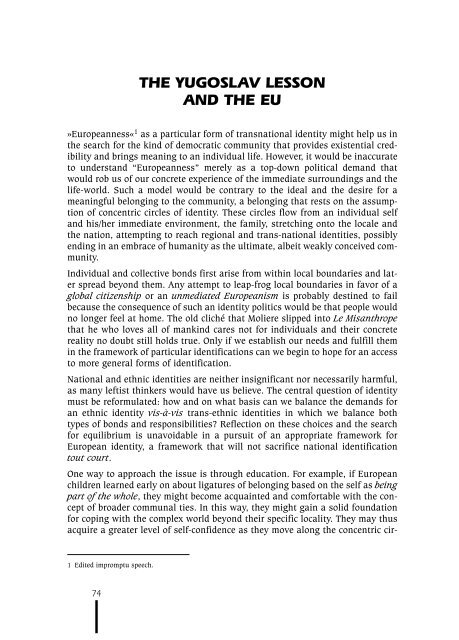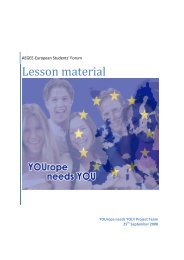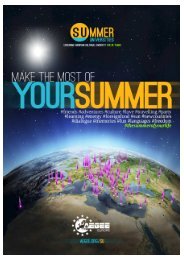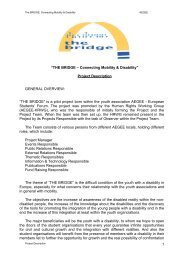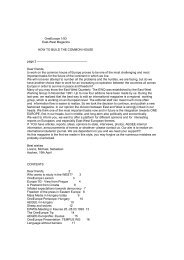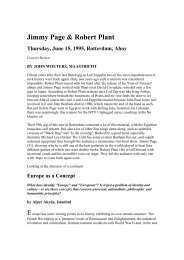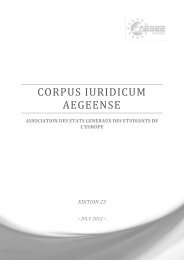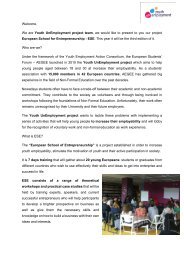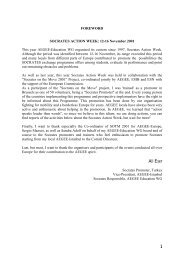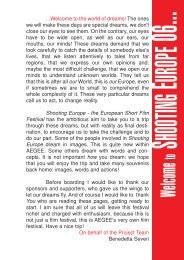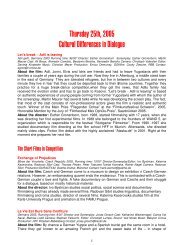europe's (torn?) identity - Projects - AEGEE Europe
europe's (torn?) identity - Projects - AEGEE Europe
europe's (torn?) identity - Projects - AEGEE Europe
Create successful ePaper yourself
Turn your PDF publications into a flip-book with our unique Google optimized e-Paper software.
THE YUGOSLAV LESSON<br />
AND THE EU<br />
»<strong>Europe</strong>anness« 1 as a particular form of transnational <strong>identity</strong> might help us in<br />
the search for the kind of democratic community that provides existential credibility<br />
and brings meaning to an individual life. However, it would be inaccurate<br />
to understand “<strong>Europe</strong>anness” merely as a top-down political demand that<br />
would rob us of our concrete experience of the immediate surroundings and the<br />
life-world. Such a model would be contrary to the ideal and the desire for a<br />
meaningful belonging to the community, a belonging that rests on the assumption<br />
of concentric circles of <strong>identity</strong>. These circles flow from an individual self<br />
and his/her immediate environment, the family, stretching onto the locale and<br />
the nation, attempting to reach regional and trans-national identities, possibly<br />
ending in an embrace of humanity as the ultimate, albeit weakly conceived community.<br />
Individual and collective bonds first arise from within local boundaries and later<br />
spread beyond them. Any attempt to leap-frog local boundaries in favor of a<br />
global citizenship or an unmediated <strong>Europe</strong>anism is probably destined to fail<br />
because the consequence of such an <strong>identity</strong> politics would be that people would<br />
no longer feel at home. The old cliché that Moliere slipped into Le Misanthrope<br />
that he who loves all of mankind cares not for individuals and their concrete<br />
reality no doubt still holds true. Only if we establish our needs and fulfill them<br />
in the framework of particular identifications can we begin to hope for an access<br />
to more general forms of identification.<br />
National and ethnic identities are neither insignificant nor necessarily harmful,<br />
as many leftist thinkers would have us believe. The central question of <strong>identity</strong><br />
must be reformulated: how and on what basis can we balance the demands for<br />
an ethnic <strong>identity</strong> vis-à-vis trans-ethnic identities in which we balance both<br />
types of bonds and responsibilities? Reflection on these choices and the search<br />
for equilibrium is unavoidable in a pursuit of an appropriate framework for<br />
<strong>Europe</strong>an <strong>identity</strong>, a framework that will not sacrifice national identification<br />
tout court.<br />
One way to approach the issue is through education. For example, if <strong>Europe</strong>an<br />
children learned early on about ligatures of belonging based on the self as being<br />
part of the whole, they might become acquainted and comfortable with the concept<br />
of broader communal ties. In this way, they might gain a solid foundation<br />
for coping with the complex world beyond their specific locality. They may thus<br />
acquire a greater level of self-confidence as they move along the concentric cir-<br />
1 Edited impromptu speech.<br />
74


